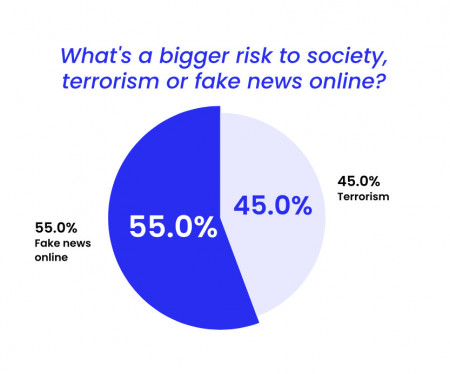New Trusted Web Foundation Report Highlights How Americans Feel About the Problem of Misinformation Online

AMSTERDAM, February 8, 2021 (Newswire.com) - The Trusted Web Foundation has released the findings from their first annual State of Misinformation in the United States 2021 Report.
The findings are based on an online survey of 1,000 Americans who were surveyed on Dec. 8, 2020, using the platform PollFish.com. The objective of the survey was to understand how the problem of misinformation impacts people's lives, their feelings towards how the problem is being addressed today, and how they see the problem evolving in the future.
Commenting on the findings, Sebastiaan van der Lans, Chairman of the Trusted Web Foundation, said: "The findings confirmed our belief that misinformation is a true risk to society that must be urgently addressed. Tackling this problem is complex and will require collaboration between corporations, policymakers, and consumers. The internet has a fundamental trust problem and we must work together to bring trust back to the internet by proactively working to reduce misinformation online".
Key findings from the U.S. report:
People were overconfident in their ability to spot fake news. 93.3% of our respondents were confident they could spot fake news, yet many still accidentally shared it — showing that perhaps they couldn't spot fake news as easily as they thought.
Fake news is more of a threat to society than terrorism. From impacting daily decisions to influencing elections, our respondents were concerned about how great of a threat fake news is to society.
Fake news impacted the 2020 Presidential elections. 70.4% of our respondents believe fake affected the Presidential elections, and 77.9% believe it affected elections in general.
Fake news is causing more people to fact-check. 38.8% now fact-check more as a result of fake news, and if faced with misleading information on a website, 63.2% will attempt to verify it.
The most encountered fake news is manipulated content or authentic material used in the wrong context — which are both visually-based. Respondents also encountered fake information, imposter news sites, fake news sites, and parody content.
Search engine returns were more trusted than social media posts. Our respondents trusted search engines to bring them more accurate and truthful information, most likely because they could see the source it's coming from.
The problem can be solved but will require government intervention. 39% of respondents believe that the problem of fake news on the internet can be solved. 47% of respondents believe that the government and regulators will need to get involved in order to see the problem addressed.
Criminalization of fake news. Over two-thirds of respondents said they would support regulations that made it a crime for people and organizations to knowingly create and share fake information.
Increasing transparency is a way to solve the fake news problem. While respondents had different thoughts on how the problem could be solved, they agreed that increasing transparency around authorship, sources, and documented changes would increase their trust in the content.
To view a full copy of the State of Misinformation in the United States 2021 Report, please click HERE.
To view a full copy of the State of Misinformation in Europe 2021 Report, please click HERE.
About the Trusted Web Foundation
The Trusted Web Foundation educates, empowers, and accelerates all stakeholders of the internet to land a vision and operationalize timestamping; from consumers to governments, from publishers to policymaker, and from e-commerce platforms to advertisers and media buyers. To find out more about the Trusted Web Foundation, visit www.TheTrustedWeb.org.
Media Contact: holly@frontlies.io
Source: The Trusted Web Foundation